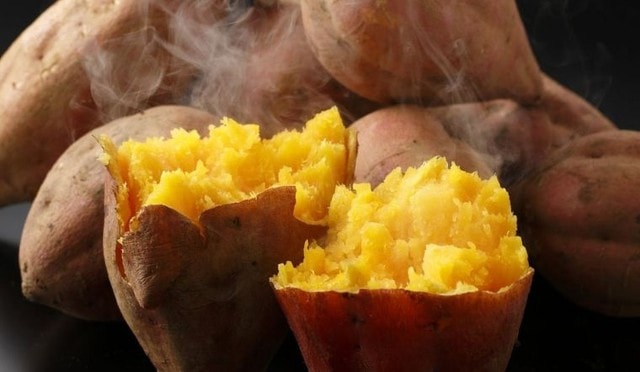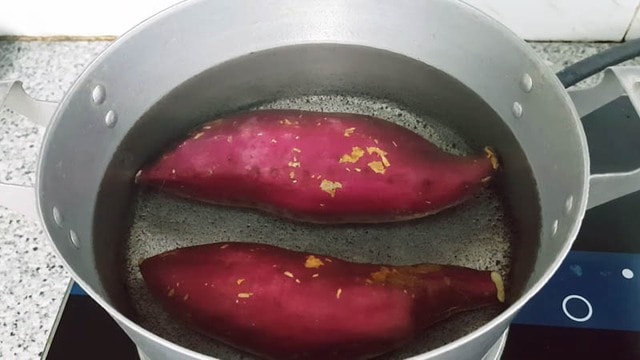Should diabetics eat sweet potatoes?
Many people ask whether they should eat sweet potatoes if they have diabetes.
Sweet potatoes are known to be high in fiber, packed with antioxidants, and have a low glycemic index, meaning they don’t have an immediate impact on blood sugar levels. This can help people with diabetes control their blood sugar levels.
Sweet potatoes can be prepared in a variety of ways, including boiled, steamed, baked, or microwaved. No matter how you eat them, this starchy vegetable provides a rich source of nutrients to supplement your diet. However, not everyone knows how sweet potatoes affect blood sugar and how to incorporate them into a healthy, balanced diet.
1. Nutritional composition of sweet potatoes

Sweet potatoes come in many varieties, including purple, yellow, white, honey, and Japanese. Sweet potatoes are rich in vitamins A, B6, and C, potassium, and fiber. However, orange sweet potatoes contain more beta carotene, while purple sweet potatoes contain more anthocyanins. Both beta carotene and anthocyanins are health-promoting antioxidants. A medium-sized sweet potato contains a moderate amount of starchy carbohydrates, is a good source of fiber, and has an impressive vitamin and mineral content.
According to the United States Department of Agriculture (USDA) organic certification, one medium cooked sweet potato (114g) with skin contains the following nutrients:
Calories: 103 Carbohydrate: 24g Sugars: 7g Fiber: 4g Protein: 2g Fat: 0g Sodium: 41mg Potassium: 542mg Vitamin C: 22mg Vitamin A: 1,100mcg
2. How do sweet potatoes affect blood sugar?
Like all foods that contain carbohydrates, sweet potatoes can raise blood sugar. How much blood sugar rises depends on the total portion size, how the sweet potato is cooked, and what other foods are added to it.
However, according to nutritionists, sweet potatoes should not be completely cut out of the menu just because they contain carbohydrates. The US Centers for Disease Control notes that there is no exact serving size that is suitable for everyone, so how many carbs to eat depends on individual needs. Diabetics should see an endocrinologist and ask a nutritionist to determine the appropriate amount.
Like many other starchy foods, sweet potatoes are high in carbohydrates and low in protein and fat. This means that sweet potatoes are more likely to cause a spike in blood sugar when eaten alone. However, when combined with other foods that contain fat and protein, this can make a difference in their effect on blood sugar.
3. Can people with diabetes eat sweet potatoes?
According to Dr. Megan Huff, a cardiovascular nutritionist in Atlanta (USA), people with diabetes can still eat sweet potatoes. The fiber content in sweet potatoes, especially if eaten with the skin, can help reduce blood sugar spikes. In addition, the way you cook sweet potatoes also helps reduce the increase in blood sugar. For example, boiled sweet potatoes have a lower glycemic index than baked sweet potatoes. The glycemic scale measures how quickly food can increase blood sugar. Therefore, foods with a low glycemic index tend to have less impact on blood sugar.
4. How should diabetics eat sweet potatoes?

People with diabetes should combine sweet potatoes with protein sources and non-starchy vegetables. These foods take longer to digest, providing “slow” energy and a slow, steady change in blood sugar levels.
To create a balanced meal, eat sweet potatoes with protein and fat to slow down digestion and sugar absorption. Sweet potatoes combined with foods rich in protein and fiber can help people with diabetes better control blood sugar spikes after eating.
Foods that go particularly well with sweet potatoes include cheese, any protein such as chicken, seafood or steak and some foods that are high in fiber. Ideally, the fiber should come from non-starchy vegetables such as broccoli, leafy greens or green beans. Additionally, adding fat to foods high in carotenoids increases their bioavailability and conversion to the active form of vitamin A, a fat-soluble vitamin.
Dr. Megan Huff recommends boiling sweet potatoes instead of baking them because boiling causes less starch breakdown, according to a 2022 study published in the journal Food Chemistry.
Sweet potatoes are nutritious and provide a fiber-rich carbohydrate to any meal, which is important for a balanced meal whether you have diabetes or not.


